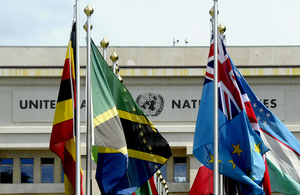UNHCR Standing Committee 69th Session: Strengthening Humanitarian-Development Cooperation in Forced Displacement Situations
This statement was delivered by the UK at UNHCR Standing Committee 69th Session during the discussion on strengthening humanitarian-development cooperation in forced displacement situations on 29 June 2017.

UNHCR's headquarters are in Geneva.
Protracted conflict and forced displacement are at an all time high, whilst solutions for conflict affected populations are increasingly out of reach. Climate change has the potential to exacerbate crises. Protracted Crises are arguably the defining humanitarian and development challenge of our generation.
The pressure on overseas development assistance is increasing and if we are to meet needs and deliver the 2030 agenda, systematic and radical change is needed to reform the international response to protracted crises and displacement. Donors must reach 0.7% GNI, which the UK has already committed to.
New approaches to helping conflict-affected populations need life-saving humanitarian support and longer-term multi-year interventions to complement each other and provide opportunities for sustainable livelihoods, access to education and long-term prospects for protracted displaced people, refugees and IDPs, and the communities that host them.
We must combine our expertise, finances and programming to meet these needs. This requires changing our mindset and attitudes, and adapting our institutes and ways of working. Humanitarian and development partners must collaborate and work together with a broader range of international and regional peace and security actors and the private sector. We also need to address root causes of conflict and increase diplomacy for prevention and conflict resolution.
The UK is committed to embedding the new approach into UK development planning and programming, including planning for protracted displacement at the onset of a crisis, providing multiyear funding for developing responses alongside essential humanitarian life-saving support, including investments in basic services: health, education and social protection. We will support the leadership of national governments and work through national systems wherever possible. We have committed to spend at least 50% of UK oda in fragile and conflict affected states and 85% of UK humanitarian funds are multiyear. We will identify non-aid instruments, for example trade, to provide incentives for policy shifts towards inclusion of refugees and displaced populations in economic opportunities and to drive economic development. We will also invest in resilience, risk management and preparedness activity. Finally we will transform the way we work with and for young people, empowering them as agents and advocates for better outcomes through our protracted crisis response.
We hope other donor governments will continue to review how they finance protracted crises and follow the UK lead.
The UK welcomes UNHCR’s leadership in facilitating the CRRF process and appreciates their approach to partnership, including with development actors such as the World Bank and UNDP. We strongly support UNHCR’s work on IDA18 financing instruments and joint engagement with the World Bank on CRRF pilots. We encourage UNHCR to expand this relationship with other development banks and bilateral agencies as well as host governments at national, municipal, and local levels. Working differently in urban contexts will be important and we welcome UNHCRs membership of the Global Alliance for Urban Crises. We also welcome UNHCR’s focus on economic inclusion.
As the UNHCR note sets out, we will need to work together if we are to deliver the 2030 agenda and leave no-one behind. It will be important for UNHCR to implement the New Way of Working approach agreed with other UN agencies at the World Humanitarian Summit, particularly at country level.
The UK is committed to delivering its Grand Bargain commitments and we are pleased to see progress by UNHCR on its commitments. Passing on multiyear benefits to its implementing partners and ensuring a truly people-centred approach to joint needs assessments and planning frameworks will be important. UNHCR will also have a critical role to play in ensuring protection remains central to this approach.